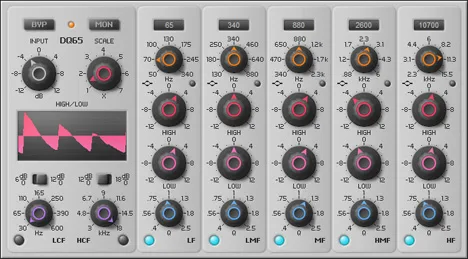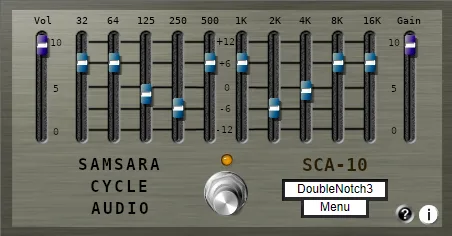DQ65 by J1000: Dynamic EQ for Controlling Audio Flow
In the world of sound recording and mixing, every engineer strives to achieve the perfect balance and clarity. Equalization is one of the most important tools on this path. However, sometimes a static equalizer is not enough, especially when dealing with instruments or vocals that have a wide dynamic range. This is where dynamic equalization comes into play – a powerful method that allows you to change the frequency response of sound depending on its volume. And today we will take a detailed look at an interesting and effective plugin that implements this approach – DQ65 from the developer J1000.
Features and Capabilities of DQ65
DQ65 is not just another equalizer in your VST plugins collection. It is a dynamic parametric equalizer, designed with a special emphasis on working with sound material that has significant volume fluctuations. Its key difference, which makes it a unique and valuable tool, lies in the implementation of dual gain control (gain or attenuation level) for each filter.
Dual Gain Control: Flexibility in Dynamics
- High Level Gain: This control allows you to set how much the filter will affect the signal when its volume exceeds a certain threshold. This is ideal for taming harsh peaks, controlling resonances that appear only at high volumes, or, conversely, for boosting certain frequencies in the loudest moments.
- Low Level Gain: This control determines the effect of the filter on the quieter parts of the signal. This makes it possible to work with the details and character of the sound that is lost at low volumes. For example, you can delicately boost the “body” of an instrument or add presence to vocals in the quieter parts without overloading the overall picture at peaks.
This approach provides unprecedented flexibility in shaping the tone of dynamic instruments. Imagine a bass guitar, where strong string strikes create unwanted rumble in the lower mids, while the quieter passages sound too thin. With DQ65, you can automatically attenuate this problematic frequency only when the bass is playing loud, and leave it untouched or even slightly boost it when the bass is playing quiet. This preserves the naturalness of the sound, while addressing dynamic and tonal balance issues.
Input Signal Scaling
Another useful feature of DQ65 is the ability to scale the input signal. This allows you to optimally use the entire dynamic range of the plugin, regardless of the signal level coming from your DAW or the previous plugin in the chain. This ensures that dynamic equalization will work as efficiently and predictably as possible.
Parametric Equalizer: Precision Settings
In addition to dynamic capabilities, DQ65 functions as a full-fledged parametric equalizer. This means that for each filter, standard controls are available: center frequency (Frequency), Q-factor (which determines the bandwidth of the effect), and, of course, two dynamic gain controls. This combination makes it possible not only to dynamically process the sound, but also to do it with high accuracy, affecting exactly those frequency areas that need it.
Who is DQ65 For?
Developer J1000 positions DQ65 as a tool created specifically for mixing tasks, especially for working with instruments and sounds that have a wide and varied dynamic range. These can be:
- Vocals (to control sibilants, add “air” or “body” depending on the volume)
- Bass guitar and double bass (to control resonances and maintain density at different playing levels)
- Acoustic instruments (guitar, piano), where dynamics are a key part of the performance
- Drums and percussion (to shape transients and control the volume of certain beat frequencies)
- Any other material where static equalization sounds unnatural due to constant volume changes.
Conclusion
DQ65 from J1000 is a flexible and powerful dynamic parametric equalizer that offers a unique approach to controlling tonal balance depending on the dynamics of the signal. Its intuitive controls, based on familiar equalizer parameters, combined with an innovative dual gain system, makes it a valuable addition to the arsenal of any sound engineer striving for a clean, controlled and natural sound of their mix. If you are facing challenges when mixing dynamic instruments, DQ65 definitely deserves your attention.



